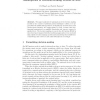Free Online Productivity Tools
i2Speak
i2Symbol
i2OCR
iTex2Img
iWeb2Print
iWeb2Shot
i2Type
iPdf2Split
iPdf2Merge
i2Bopomofo
i2Arabic
i2Style
i2Image
i2PDF
iLatex2Rtf
Sci2ools
AGI
2015
2015
Assumptions of Decision-Making Models in AGI
This paper analyzes the assumptions of the decision making models in the context of artificial general intelligence (AGI). It is argued that the traditional approaches, exemplified by decision theory and reinforcement learning, are inappropriate for AGI, because their fundamental assumptions on available knowledge and resource cannot be satisfied here. The decision making process in the AGI system NARS is introduced and compared with the traditional approaches. It is concluded that realistic decision-making models must acknowledge the insufficiency of knowledge and resources, and make assumptions accordingly. 1 Formalizing decision-making An AGI system needs to make decisions from time to time. To achieve its goals, the system must execute certain operations, which are chosen from all possible operations, according to the system’s beliefs on the relations between the operations and the goals, as well as their applicability to the current situation. On this topic, the dominating no...
Related Content
| Added | 13 Apr 2016 |
| Updated | 13 Apr 2016 |
| Type | Journal |
| Year | 2015 |
| Where | AGI |
| Authors | Pei Wang, Patrick Hammer |
Comments (0)

